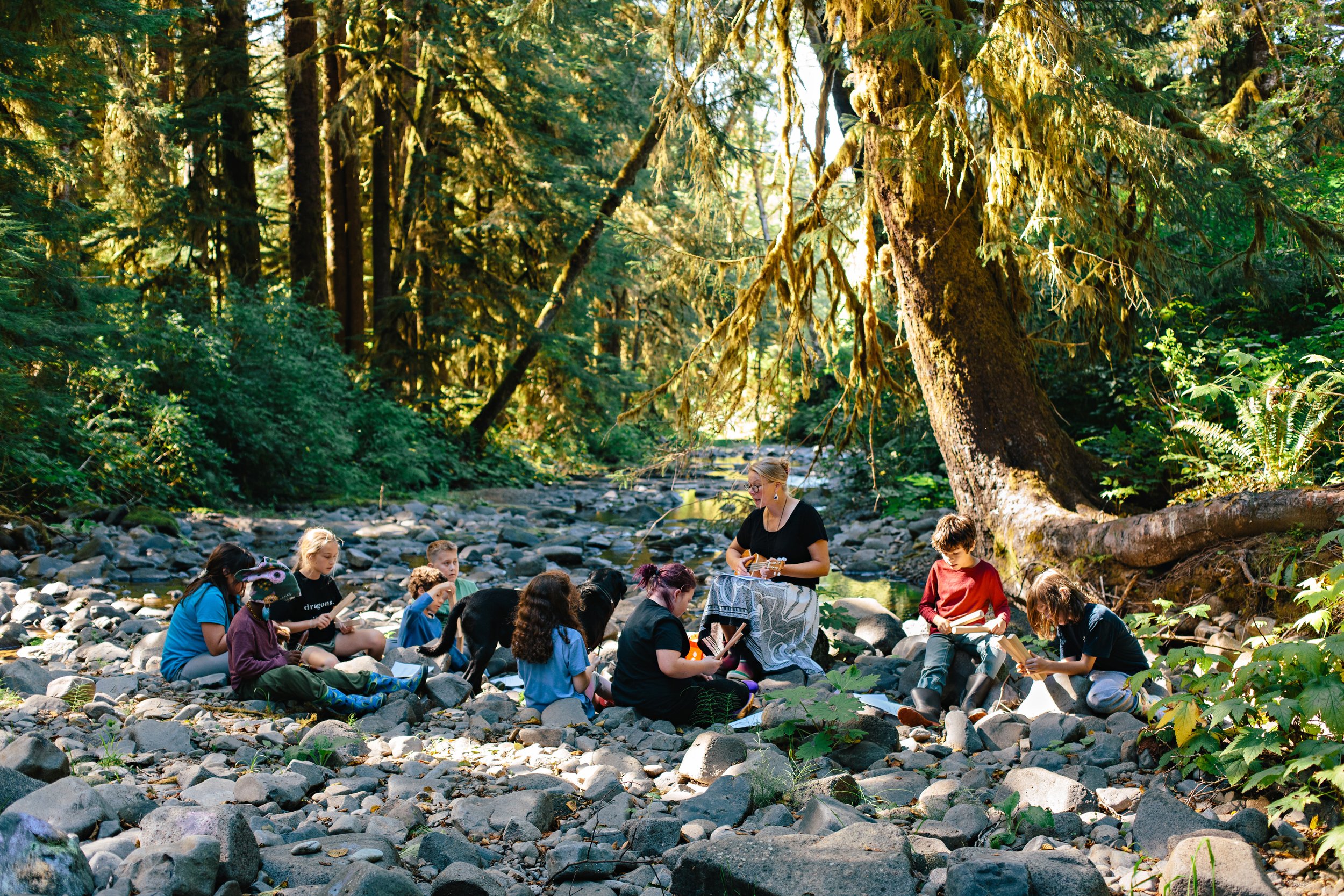
Sample Daily Routine
Our days ebb and flow with weather and emergent learning
STEAM/Discovery time
Math
Science/Social Studies
Snack and Read-aloud
Nature Adventure Walk
Writing
Recess
Lunch and Clean-up
Reading Instruction/Book Groups
DEAR (drop everything and read/rest)
Science/Notebooks/Writing
End of Day Clean
Time to Play before going home
Learning Arc & Curriculum: Grades 1–5
Our primary program for Grades 1–5 is designed to honor the developmental journey of the whole child—intellectually, emotionally, socially, and physically. Students in these grades build foundational academic skills while expanding their sense of identity, curiosity, and connection to the world around them.
We guide students through a learning arc that begins with exploration and wonder and gradually moves toward deeper understanding, independence, and mastery. Each year builds on the last, supporting students as they grow from emerging readers and thinkers to confident, capable learners who take ownership of their education.
Literacy
Our literacy program is rooted in emergent, interest-driven learning and strong skill development. Students are immersed in reading and writing across genres, with a focus on comprehension, fluency, and authentic expression. Through read-alouds, literature circles, storytelling, and daily writing, students develop a love of language and the ability to communicate clearly and creatively.
Mathematics
Math instruction emphasizes conceptual understanding, real-world problem-solving, and number sense. Students work individually and in groups using hands-on materials, visual models, and open-ended challenges. Learning is differentiated and paced according to each child’s readiness, allowing for both support and acceleration within multiage groupings.
Science & Nature Studies
We integrate outdoor education and place-based science throughout the curriculum. Students explore natural systems, life sciences, earth sciences, and basic physics through direct observation, inquiry, and experimentation. Our outdoor classroom fosters curiosity, resilience, and a hands-on understanding of ecological principles.
Social Studies & Place-Based Learning
Grounded in place-based education, social studies connects children to their local community, culture, and history. Students explore themes of identity, citizenship, and interdependence through storytelling, research, mapmaking, and community projects. Fieldwork and service learning deepen their sense of belonging and responsibility.
Arts & Creative Expression
Art, music, movement, and drama are integral parts of the primary experience. Students are encouraged to express themselves through a wide range of media and collaborative projects. The arts are often woven into core academic work to support integrated, thematic learning.
Social-Emotional Learning (SEL)
We prioritize the development of emotional intelligence, empathy, and conflict-resolution skills. Our classrooms are safe, respectful communities where students learn to navigate emotions, build friendships, and care for one another. SEL practices are embedded in daily routines, group work, and classroom culture.
Integrated Themes & Projects
Learning across subjects is often organized around interdisciplinary themes that emerge from student interests, seasonal events, or local happenings. These projects allow students to dive deep, ask meaningful questions, and engage in extended inquiry that connects academic skills with real-world purpose.
Multiage & Differentiated Learning
Grades 1–5 are taught in multiage classrooms that encourage mentorship, collaboration, and flexible pacing. Teachers use differentiated instruction to meet each learner where they are, allowing students to revisit foundational skills or extend into more advanced work as needed. This approach fosters both academic growth and a strong sense of community.
At our school, class groupings in the Lower School are created with care and intention. Rather than placing students strictly by grade, we consider the number of students in each grade level, their developmental and academic needs, and—most importantly—where each child will thrive.
Our Lower School is often grouped into Grades 1–3 and Grades 4–5, forming two multiage learning communities. These groupings allow students to benefit from peer modeling, leadership opportunities, and individualized instruction.
Because learning isn't one-size-fits-all, our teachers differentiate across ages and skill levels—ensuring every student is both supported and challenged. It’s a dynamic, flexible approach that nurtures confidence, connection, and academic growth.
By the end of Grade 5, students emerge as independent thinkers, compassionate community members, and confident learners—ready to engage in deeper academic inquiry and leadership in their upper elementary and middle school years.



